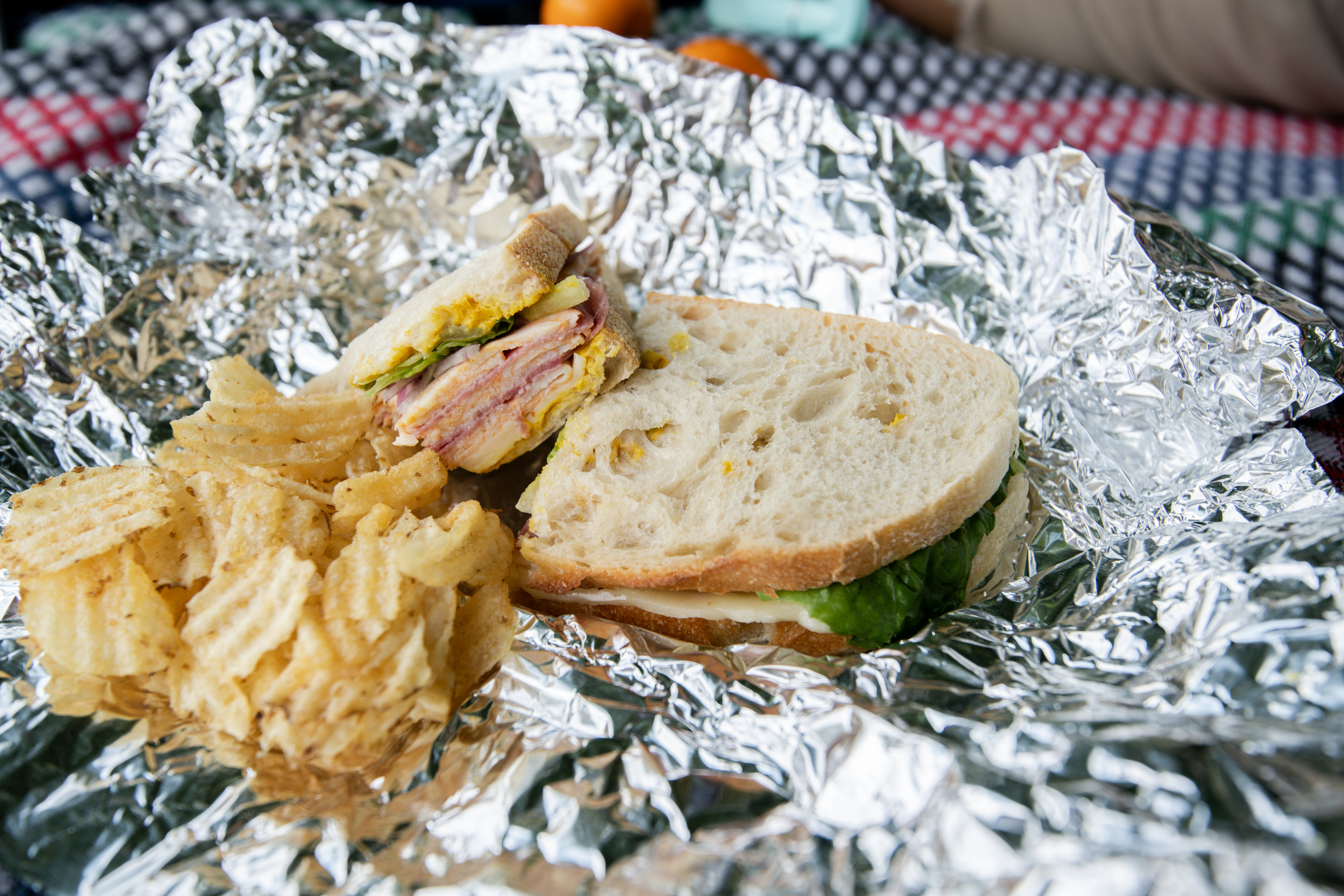Americans waste food on a grand scale. Though figures are appalling–30-40% of our food supply gets wasted, by USDA estimates, about 60 million tons a year, worth over $200 billion – big numbers fail to change behavior.
First-year students in a seminar I teach on the history of American diet trends are reliably conscientious about the environment, but they regularly report that they don’t eat leftovers.
Two images might help explain why some Americans have a hard time addressing the problem.
The first image: On the Tri-State Tollway rounding Chicago, a billboard photo shows a foil pan of half-eaten dinner, with the explanatory caption, “Eat Your Roommate’s Leftovers.” A project of WildAid, the roadside sign is opposite the kind of food photography that usually grabs at viewers’ attention, the fancy plates on social media or sizzling burgers on sports commercials. Like those, the billboard is supposed to provoke in viewers the desire to eat. Unlike those, desire is supposed to spring from guilt not pleasure, from provoked conscience rather than appetite.
It’s not your mother’s food-waste strategy. Scarce are reprimands to clean your plate because children somewhere in the world are starving. Today’s waste campaigns are likelier to guilt-trip on environmental grounds: food sent to landfills generates gas emissions that worsen climate change. Those appeals blend into other dire diagnoses of the climate, simultaneously urgent and hopeless. Alternatively, this food-waste strategy tries to soothe consciences fast by assigning an action item, like composting. Composting is fine. Limp lettuce and apple cores help us see our diligence make the difference between seeping emissions and beautiful dirt. As a remedy to the food-waste problem though, composting comes way too late.
Appeals made to the environment or to human life are not opposite in principle. To the contrary, God created the fruitful world and gave plants as food to humans created from “the dust of the ground” (Genesis 1:11-12, 29-30, 2:7). Human and humus are rooted in the same word, the creatures connected to the flourishing of the earth whose stewardship God entrusted them. Many occasions in Old and New Testament address stewardship of food in literal and metaphorical terms. Food is not ultimate but makes material reminder of God’s provision. Humans suffer when the land does. But campaigns prioritizing planet or climate abstracted from human need serve none of those goals well.
Nobody should claim status as friend of the environment without confronting casual food waste, his own unwanted leftovers or his roommate’s. Wasting food offends against so many goods that tossing leftovers should be nearly unthinkable. Public service announcements lend urgency to climate-related concerns, an EPA infographic explaining, “Each year, the emissions caused by wasted food in the U.S. are greater than emissions from all domestic flights within the US plus all international flights run by US airlines,” words appearing next to an illustration of a woman discarding half a burger.
This is what you throw away when you put a burger half in the trash. You throw away the energy and labor entailed in producing all its ingredients: the dirt, water, and fertilizer to grow them, plus the pesticides that kept predators away from the wheat and the meat and the lettuce and tomato. You throw away the costs of farm labor, fertilizer runoff, and collateral damage that pesticides inflict on pollinators. Meat was an animal that had to be bred, born, medicated, fattened, led out, bled out, divided, chopped, and cooked in order to arrive on the bun. For sure, omnivores can scruple over eating meat and decide it is worth the sacrifice, since nature is red in tooth and claw. We might be able to stand the squeal when we are using every other part of the hog. But that justification has nothing to say to livestock slaughtered so their flesh can be thrown in the garbage.
When we throw away the half burger in its single-use carton or wrapper, we take with it the other packaging materials carried along before and the refrigerated road miles in between. Human labor got the burger out the door, time spent standing over griddle or spreading sauce on bun. The last kind of waste can be stated simply. It’s just cash. Throwing away the burger half is throwing your own money in the garbage.
At last, now, and only now, is it time to begin thinking about compost as a reasonable response to food waste. We could do better.
Food systems are complex. Despite tariff spikes, American food usually is artificially cheap, farm policies masking actual costs. On average, consumers spend about 11% of disposable income on food, though lower-income households spend higher percentages and higher-income ones spend a lower percentage. Less than half of those dollars are now spent on food prepared at home. Large-scale shifts in employment and parenting manners in the late twentieth century moved American dining ideals away from family dinner.
Waste happens in different ways. Sometimes we are careless, buying too much or not planning well. Sometimes we just don’t care. Excuses for throwing away food prioritize maximal preference, the pique of our cravings. The thing we savored last night is soggy by tomorrow. Or we wanted Chinese yesterday but Mexican food today. Food waste is caused by the abundance and cheapness of our food but also by our whims. If food is not just fuel, it’s not an exercise in self-pleasure either.1
Consider the leftover. The label did not exist until the early twentieth century, historian Helen Veit reports, since the fact of surplus food with safe storage was unusual enough to not need terminology. Refrigeration and manufactured plenty invented a new reality that required a new name. Not until midcentury did grousing about leftovers signal sophistication and throwing them away signal status.2 Why does it still? Most atomic-age conspicuous consumptions embarrass us now. But ordinary people still say they don’t like leftovers.
Some who toss their take-out might be tempted to blame restaurants for serving us the big portions we throw away. Restaurants upsell. But surely most diners would not celebrate getting less food than they paid for. Blaming restaurants’ portion size became a poorer excuse when take-out boomed during Covid, when Americans got into the habit of eating meals at home but not from home. Take-out is practically pre-emptive leftovers, food packed for us as though for storage before we take the first bite. To-go containers let diners eat the amount they wish and save the rest for later. Food delivery could have reduced waste habits if we thought differently.
If we thought differently: greenhouse gases may stink to heaven, but the very dirt underfoot cries out against us when food rots in a world where people go hungry. The environmental case against food waste is solid but may not persuade enough. We still need to think about what food costs on a human scale. If your mother’s advice does not ring true, a version from somebody else’s grandmother can make the point. In her cookbook The Italian Baker, the late Carol Field reports folk belief that people who waste bread spend time in purgatory picking up breadcrumbs with their eyelashes. That seems about right.
To Italy, then, for the second image. Before dinner in the kitchen of a family living north of Milan, our friends from an au pair stint, whoever is making dinner measures the amount of dry pasta they need by slightly under-filling the bowls from which everybody will eat their serving. They scant a little because the noodles will expand. Then they pour that amount and no more into the boiling pot. At dinner, there is enough for each person. There are no leftovers.
Their small kitchen shows something that the billboard misses. The second image is an object lesson that other people are implicated in what we eat at every stage. For the person cooking, measuring that way reminds how many have to be fed with the ingredients, who they are, where and when they will eat what is made. For the person eating, that measurement reminds that nourishment depends on someone else’s investment of time, labor, and consideration.
Since nearly half of the food waste in the US occurs on the level of household and consumer, we have opportunity to do better every day that we have the privilege of eating. Common prescriptions for better food management reveal deep dysfunction, though. The EPA food-waste toolkit spells out steps painstakingly, as though it presupposed near-total ignorance about food. Young adults’ presumed innocence of kitchen skills shows intergenerational fallout of too much take-out.
The other silver lining of our food-waste habits, besides their corrigibility, is snuffing out self-righteousness. Who is fit to cast first stone? Food-related commands are among the clearest Jesus gives. Jesus assures that giving food to the hungry is like giving it to Him (Matthew 25:35, 40). The rich man who feasted daily but left Lazarus to languish at the gate is denounced by the crumbs from his own table (Luke 16:19-20). Some social reforms struggle to find scriptural sanction, but the gospels show Jesus explicit on this one, meeting multiplied loaves with a command to gather up the leftovers and waste none.
Footnotes
- For analysis of US food culture and the hope of redemption by diet, see Adrienne Rose Bitar, Diet and the Disease of Civilization (New Brunswick, NY: Rutgers University Press, 2018).
- Helen Zoe Veit, Modern Food, Moral Food: Self Control, Science, and the Rise of Modern American Eating in the Twentieth Century (Chapel Hill: University of North Carolina Press, 2103), 131.
























I appreciate this discussion of the problem of food waste – especially its environmental and climate impact. But I submit two comments. First, the industrial food system overproduces and so requires overconsumption – i.e., purchase but not necessarily eating. Post-consumer food waste is of no economic significance. There is no incentive for the system to reduce post-consumer waste. Second, we have an obesity epidemic (which has spread around the world). We are overfeeding an overfed nation. Eating is a pleasurable activity, and the food industry has utilized this neuropsychological fact to produce food that induces more and more eating behavior. For example, see David Kessler, Diet, Drugs, and Dopamine, 2025. As Christians, we certainly need to take some responsibility for the problem of food waste, but I doubt much will change until the industrial food system is somehow induced to reduce the supply of food, make it more expensive, and incentivize conservation. And that won’t happen any time soon.